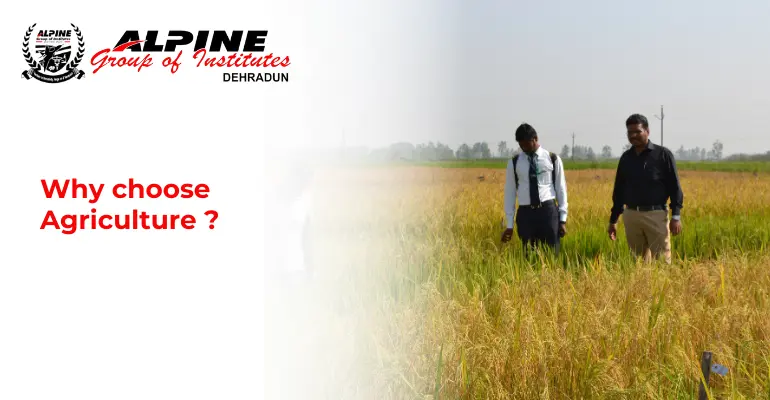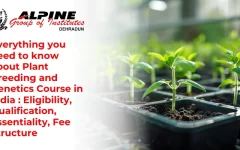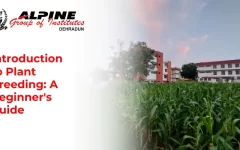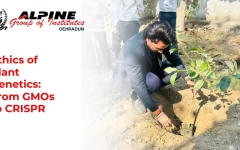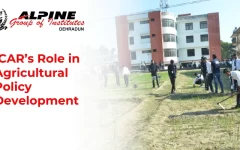Why Choose Agriculture?
2025-07-05 9:19Why Choose Agriculture?
Agriculture is often seen as a traditional field—one that involves farming, crops, and livestock. But in reality, agriculture is an exciting, dynamic, and ever-evolving industry that plays a central role in addressing some of the world’s most pressing challenges. From feeding a growing global population to mitigating the effects of climate change, agriculture touches every aspect of human life and the environment.
Choosing Agriculture allows you to contribute to solving some of the world’s most significant challenges—ensuring food security, combating climate change, and promoting sustainability. Whether you are interested in science, technology, business, or environmental conservation, agriculture offers a range of exciting and impactful career opportunities.
Agriculture is no longer just about farming; it’s about innovating solutions for the future of food, natural resources, and the environment. If you are looking for a field that combines practical work with research, technology with nature, and local issues with global impact, agriculture is the right choice.Agriculture as a career or academic field offers numerous benefits, both from a personal fulfillment perspective and due to its global significance. Agriculture is the backbone of any economy, particularly in developing countries, and has evolved to encompass a wide range of interdisciplinary fields, including environmental science, biotechnology, food technology, sustainable farming, and more.
Reasons why you should choose Agriculture as a field of study or career
1. Vital Role in Global Food Security
Feeding the World:
Agriculture is directly linked to food production and food security. With the global population expected to surpass 9 billion by 2050, the demand for food will continue to increase. Agriculture professionals help develop more efficient farming practices, better crop varieties, and sustainable food systems to feed the world.
Diverse Career Opportunities:
From crop production to food processing, pest control to agricultural marketing, there is a vast spectrum of careers within agriculture.
2. Economic Importance
Contribution to GDP:
In India, Agriculture contributes significantly to the GDP and employment. Even in developed nations, agriculture remains a vital sector, supporting millions of jobs in farming, food production, research, policy-making, and related industries.
Entrepreneurial Opportunities:
Agriculture offers opportunities for innovation and entrepreneurship. You can start your own farm, engage in agri-business (like organic farming, agro-processing, or farm-to-market initiatives), or work in agritech startups.
3. The Heart of Global Food Security
- By pursuing a career in agriculture, you are contributing directly to solving one of humanity’s most fundamental needs—ensuring that there is enough nutritious food for everyone.
- From developing drought-resistant crops to innovating food production systems, agricultural professionals have the power to make a profound impact on global food security.
4. Technological Advancements in Agriculture
Agri-tech Innovation:
Modern agriculture is a rapidly evolving field thanks to advancements in technology. Innovations like precision farming, drone monitoring, genetically modified crops, artificial intelligence (AI), and big data analytics are transforming the way farming is done, making it more efficient, productive, and eco-friendly.
Agri-Business and Food Processing:
The development of agri-business and food processing industries offers new avenues in marketing, food quality control, packaging, distribution, and product innovation.
Increasing Demand for Experts:
As the world’s population grows and the environmental challenges mount, there will always be a high demand for skilled professionals in agriculture. Whether it’s in crop science, animal husbandry, agronomy, food safety, or agricultural economics, agriculture professionals are needed across sectors.
Farm Management:
Overseeing the operations of a farm and making decisions about crop production, livestock management, and business strategies.
Agricultural Engineering:
Designing machines, systems, and structures that improve agricultural practices and increase productivity.
Agri-Business:
Running or managing companies that produce or sell agricultural goods, equipment, and services.
Food Technology:
Developing better methods of food processing, packaging, and preservation to improve the efficiency and safety of food products.
Sustainable Agriculture and Environmental Management:
Working to make farming more sustainable, conserve natural resources, and reduce agriculture’s environmental impact.
Wide Range of Career Choices:
A degree in agriculture can open doors to careers in:
- Farm Management
- Agricultural Engineering
- Agribusiness Management
- Agricultural Research & Development
- Soil Science
- Horticulture & Forestry
- Veterinary Science
- Food Technology & Processing
- Policy Making & Rural Development
5. Rural Development and Livelihood Enhancement
Support for Rural Communities:
Agriculture is closely linked to rural development. Many developing countries, including India, depend on agriculture for the livelihoods of rural populations. Professionals in agriculture work on improving rural infrastructure, promoting income-generating agricultural activities, and enhancing farmers’ quality of life.
Livelihood Security:
Agricultural practices also play an essential role in promoting livelihood security in rural and semi-urban areas by providing income opportunities, improving food availability, and offering job prospects in related sectors.
6. The Technological Revolution in Agriculture
Agriculture is experiencing a technological transformation. Precision farming, artificial intelligence (AI), drones, big data analytics, and biotechnology are all revolutionizing the industry. These innovations are making farming more efficient, sustainable, and productive.
Drones and Satellite Imaging:
Used to monitor crop health, soil moisture levels, and predict yields.
Genetically Modified Crops:
Develop crops that are resistant to pests, diseases, or extreme weather conditions.
Robotics and Automation:
Automating repetitive tasks such as planting, harvesting, and sorting, which increases efficiency and reduces labor costs.
Data Analytics:
Using big data to predict weather patterns, optimize irrigation systems, and monitor crop growth, leading to more informed decision-making.
7. Addressing Climate Change and Environmental Sustainability
Agriculture has a unique and crucial role in combating climate change. While farming practices can contribute to greenhouse gas emissions, agriculture also holds the key to mitigating some of the worst effects of climate change. By pursuing a career in agriculture, you’ll be part of the solution, helping to create farming systems that are both environmentally and economically sustainable.
Some ways agriculture professionals are tackling climate change include:
Developing Climate-Resilient Crops:
Researching crops that can withstand extreme weather conditions like drought, floods, or temperature fluctuations.
Promoting Sustainable Practices:
Implementing organic farming, crop rotation, agroforestry, and reduced chemical usage to minimize environmental harm.
Soil Conservation:
Advancing techniques to maintain soil health and prevent erosion, ensuring that land remains productive for future generations.
Water Management:
Developing efficient irrigation systems and strategies for water conservation, a critical resource as droughts and water scarcity become more prevalent.
Conclusion: A Future-Oriented Career Path
Choosing agriculture is not just about choosing a career—it’s about choosing a future. Agriculture touches every part of our lives, from the food we eat to the clothes we wear, the energy we consume, and the environment we live in. As the world faces complex challenges such as climate change, food insecurity, and population growth, the need for skilled professionals in agriculture has never been more urgent.
If you are someone who values innovation, sustainability, and the chance to make a real impact in the world, agriculture offers a dynamic and rewarding career. By choosing agriculture, you’ll not only be shaping the future of food and farming, but also contributing to a more sustainable and equitable world.


